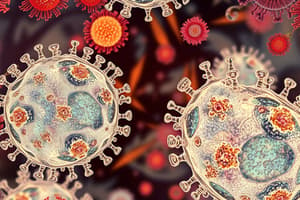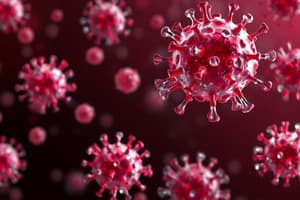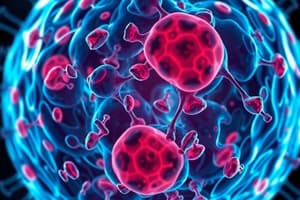Podcast
Questions and Answers
Which of the following is NOT a characteristic of adaptive immunity?
Which of the following is NOT a characteristic of adaptive immunity?
- It involves the production of antibodies.
- It is specific to a particular pathogen.
- It has a rapid response time. (correct)
- It provides long-lasting immunity.
What is the role of MHC (Major Histocompatibility Complex) molecules in T cell activation?
What is the role of MHC (Major Histocompatibility Complex) molecules in T cell activation?
- MHC molecules activate T cells independently of antigens.
- MHC molecules suppress the activity of T cells.
- MHC molecules directly recognize and bind to viral antigens.
- MHC molecules present viral antigens to T cell receptors. (correct)
Which of the following events occurs during signal transduction in T cell activation?
Which of the following events occurs during signal transduction in T cell activation?
- T cells differentiate into memory cells.
- T cells release cytokines to activate other immune cells. (correct)
- T cells directly kill infected cells.
- T cells produce antibodies to target specific pathogens.
Which of the following best describes the relationship between T cell receptors and antigens?
Which of the following best describes the relationship between T cell receptors and antigens?
What is the primary function of T cells in adaptive immunity?
What is the primary function of T cells in adaptive immunity?
What happens when an individual with Type B blood receives a blood transfusion from a donor with Type A blood?
What happens when an individual with Type B blood receives a blood transfusion from a donor with Type A blood?
Which of the following blood types can a person with Type AB blood receive safely?
Which of the following blood types can a person with Type AB blood receive safely?
What is the primary reason for the development of anti-D antibodies in Rh-negative individuals?
What is the primary reason for the development of anti-D antibodies in Rh-negative individuals?
Which of the following conditions can result from Rh incompatibility between a mother and her fetus?
Which of the following conditions can result from Rh incompatibility between a mother and her fetus?
How do doctors prevent hemolytic disease of the newborn (HDN) in Rh-negative mothers?
How do doctors prevent hemolytic disease of the newborn (HDN) in Rh-negative mothers?
Why does injecting anti-D antigen antibodies into an Rh- mother prevent the development of Rh disease in subsequent pregnancies?
Why does injecting anti-D antigen antibodies into an Rh- mother prevent the development of Rh disease in subsequent pregnancies?
Which type of immune cell is responsible for recognizing and destroying pathogens directly?
Which type of immune cell is responsible for recognizing and destroying pathogens directly?
What is the primary function of neutrophils?
What is the primary function of neutrophils?
Which of the following cells are NOT considered to be a phagocyte?
Which of the following cells are NOT considered to be a phagocyte?
What is the primary function of dendritic cells?
What is the primary function of dendritic cells?
Which type of lymphocyte is responsible for the production of antibodies?
Which type of lymphocyte is responsible for the production of antibodies?
Which of the following cells is NOT a granulocyte?
Which of the following cells is NOT a granulocyte?
What is the role of memory cells in the adaptive immune response?
What is the role of memory cells in the adaptive immune response?
What type of cell presents exogenous antigen?
What type of cell presents exogenous antigen?
Which of these is NOT a co-stimulatory molecule?
Which of these is NOT a co-stimulatory molecule?
What is the function of helper T cells?
What is the function of helper T cells?
Which of these is an example of an endogenous antigen?
Which of these is an example of an endogenous antigen?
Which type of immune response is triggered by the exposure of a non-pathogenic antigen?
Which type of immune response is triggered by the exposure of a non-pathogenic antigen?
Which blood type is considered the universal donor?
Which blood type is considered the universal donor?
If a person with AB+ blood type needs a blood transfusion, what blood type(s) can they receive?
If a person with AB+ blood type needs a blood transfusion, what blood type(s) can they receive?
Which of the following is NOT a reason why knowing your blood type is important?
Which of the following is NOT a reason why knowing your blood type is important?
Flashcards
T cell activation
T cell activation
The process by which T lymphocytes become activated upon binding to MHC-antigen complexes.
Innate Immunity
Innate Immunity
Rapid, non-specific defense mechanism against pathogens.
Adaptive Immunity
Adaptive Immunity
Slower, specific immune response tailored to specific pathogens.
MHC (Major Histocompatibility Complex)
MHC (Major Histocompatibility Complex)
Signup and view all the flashcards
Rh factor in pregnancy
Rh factor in pregnancy
Signup and view all the flashcards
Cross-reactions in blood transfusions
Cross-reactions in blood transfusions
Signup and view all the flashcards
Type B blood donor to Type A recipient
Type B blood donor to Type A recipient
Signup and view all the flashcards
Agglutination prediction chart
Agglutination prediction chart
Signup and view all the flashcards
Hemolytic disease of the newborn
Hemolytic disease of the newborn
Signup and view all the flashcards
Anti-D antibody injection
Anti-D antibody injection
Signup and view all the flashcards
No immunological memory
No immunological memory
Signup and view all the flashcards
Subsequent pregnancy safety
Subsequent pregnancy safety
Signup and view all the flashcards
Types of white blood cells
Types of white blood cells
Signup and view all the flashcards
Phagocytes
Phagocytes
Signup and view all the flashcards
Granulocytes
Granulocytes
Signup and view all the flashcards
Antigen-presenting cells (APCs)
Antigen-presenting cells (APCs)
Signup and view all the flashcards
MHC class II
MHC class II
Signup and view all the flashcards
Function of Helper T cells
Function of Helper T cells
Signup and view all the flashcards
MHC class I
MHC class I
Signup and view all the flashcards
Activation of Cytotoxic T cells
Activation of Cytotoxic T cells
Signup and view all the flashcards
Immediate Hypersensitivity
Immediate Hypersensitivity
Signup and view all the flashcards
Delayed Hypersensitivity
Delayed Hypersensitivity
Signup and view all the flashcards
Blood Types
Blood Types
Signup and view all the flashcards
Importance of Knowing Blood Type
Importance of Knowing Blood Type
Signup and view all the flashcards
Study Notes
Adaptive Immunity Overview
- Adaptive immunity is a slower, specific immune response to pathogens.
- It involves lymphocytes, specifically T cells and B cells.
T Cell Activation
- T cell receptors bind to antigens presented by MHC molecules.
- This binding, along with co-stimulation, activates the T cell.
- Signal transduction inside the T cell causes activation.
- Two main types of T cells are Helper T cells (CD4+) and Cytotoxic T cells (CD8+).
MHC Class I and II
- MHC Class I molecules are found on all nucleated cells and present endogenous antigens to cytotoxic T cells.
- MHC Class II molecules are found on antigen-presenting cells (APCs) like dendritic cells, macrophages, and B cells and present exogenous antigens to helper T cells.
T Cell Types and Functions
- Helper T cells (CD4+) release cytokines to activate other immune cells like cytotoxic T cells and B cells.
- Cytotoxic T cells (CD8+) kill infected or cancerous cells through various mechanisms including perforin and granzymes or by activating the "death receptor" Fas.
B Cell Activation
- B cells can be activated by antigen binding to B cell receptors (BCRs).
- Helper T cell activation plays a crucial role in B cell activation, especially for antibody production and memory.
Immune Responses to Pathogens
- Antibodies, from activated B cells, act as opsonins, making pathogens easier for macrophages to engulf.
- Macrophages process and present antigens, activating other cells in the immune response.
Immune Responses to Non-Pathogens; Allergy
- Allergic reactions involve exaggerated immune responses to harmless substances (allergens)
- Two main types are immediate hypersensitivity (IgE response) and delayed hypersensitivity.
- Immediate hypersensitivity is a fast, often severe, response involving mast cell activation and release of inflammatory mediators.
Blood Types and Transfusions
- Blood type is determined by antigens on red blood cells (RBCs).
- ABO blood group has A, B, AB, and O types.
- Rh factor (positive or negative) is another important blood type characteristic.
- Cross-reactions during blood transfusions occur if donor antigens trigger recipient antibodies, causing agglutination and hemolysis.
Rh Factor and Pregnancy
- Rh-negative mothers can develop anti-D antibodies if exposed to Rh-positive fetal blood.
- This can lead to hemolytic disease of the newborn if the mother has subsequent pregnancies with Rh-positive fetuses.
- Doctors can prevent this by administering anti-D antibodies to Rh-negative mothers.
Preventing Hemolytic Disease of the Newborn
- Injecting anti-D antibodies into Rh-negative mothers during and after their pregnancy can prevent Rh-positive fetal blood from triggering an immune response.
Summary
- T cells activate through binding to MHC-bound antigens.
- Immediate hypersensitivity is an exaggerated immune response.
- Knowing blood types is crucial to avoid transfusion reactions.
- Rh incompatibility during pregnancy can cause hemolytic disease of the newborn.
- Doctors administer anti-D antibodies to Rh-negative mothers to prevent this.
Studying That Suits You
Use AI to generate personalized quizzes and flashcards to suit your learning preferences.




